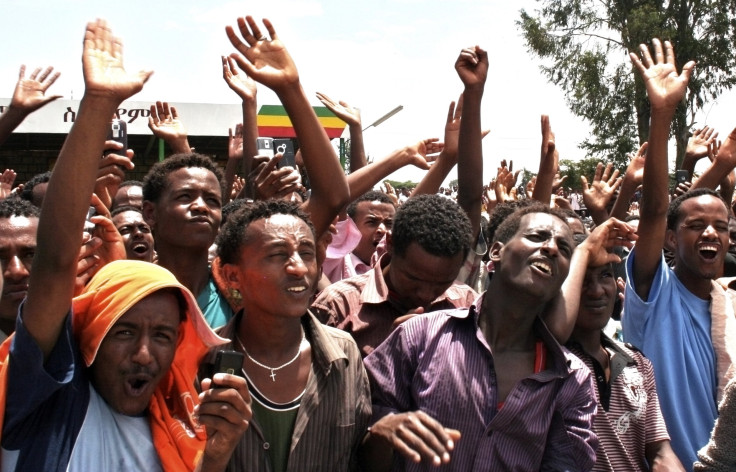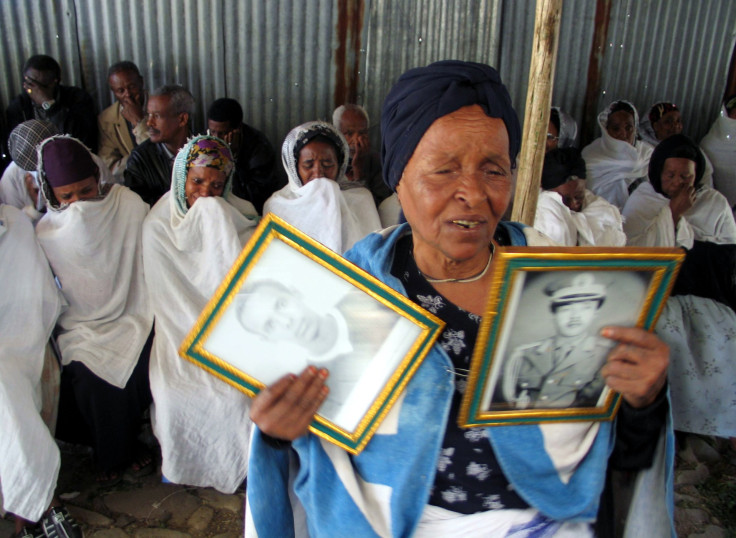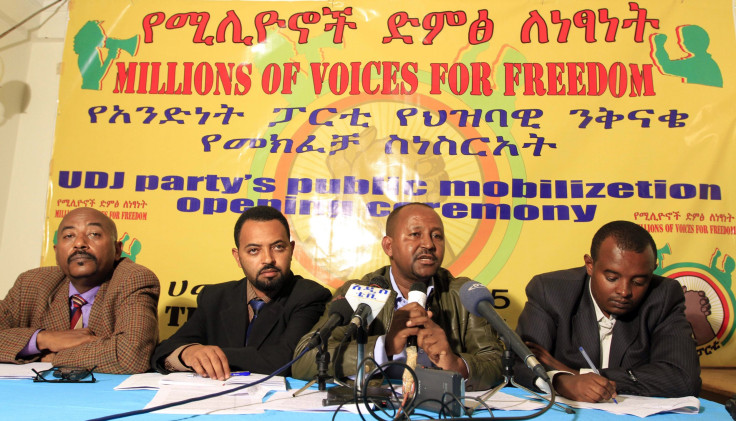Fear And Loathing In Ethiopia: Groups, Individuals Cite Government Abuse In New Opposition Party Report

ADDIS ABABA, Ethiopia-- Members of this northeast African nation's most prominent opposition party say they weren't doing anything wrong one day in late September when police officers came along to stop, question and detain them.
Several members of the group had gathered in Kazanches, a central neighborhood in Ethiopia's capital city of Addis Ababa, to hand out flyers and promote a Sept. 29 demonstration. Having already secured governmental permission for their upcoming protest, they expected no interference.
“I don't know why, and I don't know who ordered them, but some police officers came and told us to stop distributing the brochures,” opposition activist Daniel Tefera told IBTimes. “I said, 'This is our constitutional right, and you have no right to stop this.' But two policemen called another five policemen and without any reason, they took us to the police station. We were arrested for four hours.”
Tefera is the communications officer for the Unity for Democracy and Justice, or UDJ. The party, which is part of Ethiopia's largest opposition coalition, Medrek, is one of several that accuse the government of stifling political dissent. UDJ recently became the first to lay out the details of the ruling party's alleged abuses in a 39-page formal report that is full of stories like Tefera's.
“Since it has taken power, the current government of Ethiopia has been harassing its people in different locations and times,” the report claims. “Usually those people whose human rights are abused are members of opposition political parties and their advocates.” The document goes on to give accounts of more than 150 alleged human rights abuses committed against party members and other civilians since 2010. Most involve arbitrary detention, but some point to beatings, torture, religious persecution and even civilian deaths as a result of relocation efforts.
The scores of victims mentioned include Getu Mekicha, a party officer in Gojjam, who in February of this year was robbed of about 150 birr ($8) and kicked severely by a local official, breaking his hand; Gezahagn Mekonen, a party member who was “snatched forcefully” from his Oromia residence in October 2012, rendering his entire family homeless; and Abebe Akalu, a public relations worker for UDJ, who was arrested in October this year. The report claims that while in custody, Abebe was forced to consume alcohol, frightened with a pistol, beaten and threatened that “unless he stops his peaceful political struggle, he will be blamed as a terrorist who is trying to overthrow the government and at risk of life imprisonment.”
In some cases, the alleged abuses have resulted in social and economic ostracism. Party member Beshir Basaye was distributing opposition literature in Oromia when he was arrested in March of 2012, according to the report, and detained for more than four months. Upon his successful appeal and subsequent release, he tried to resume his work in wholesale coffee trade. But the report claims that “the local cadres are making a campaign to the local coffee producers not to supply coffee to him. In doing so, the officials are causing great problems in the livelihood and existence of the [victim].”
The document, written in Ethiopia's official language, Amharic, was first unveiled at a UDJ press conference on Oct. 31 but was not finalized and published online until a few days later. It was hand-delivered to the prime minister's office on Dec. 2, but party chairman Negasso Gidada wasn't sure the report would get much of a reception there. “When they see it comes from UDJ, they might throw it in the rubbish bin!” he told IBTimes. “I don't think they will react.” Negasso served as president of Ethiopia from 1995 to 2001 but fell out with the ruling coalition months before his term ended. He formally joined UDJ in 2009 in order, he says, to bring about a more transparent, democratic system of governance and to help unify the country.
As it turned out, UDJ's report did get a reception at the prime minister's office this month, albeit a cool one. “We're a very responsible government, so we have to look into the allegations made by UDJ,” said government spokesman Getachew Reda in a phone interview. “The reading of the report suggests that it's more innuendos and unsubstantiated claims. We have to get all the details before we respond to every specific allegation, but these are the same claims that have been regurgitated by opposition groups for years.”
Political opposition groups have a complicated history in Ethiopia, which boasts one of Africa's fastest-growing economies and its second-largest population. The ruling coalition, the Ethiopian People's Revolutionary Democratic Front, or EPRDF, first coalesced as a rebel group fighting against the socialist Derg administration. It came to power in 1991 and hasn't lost control of the Ethiopian political scene since. A controversial election rocked the country in 2005, when early results predicted massive gains for the Coalition for Unity and Democracy, then the most prominent opposition group. After the much-delayed final results delivered a majority to the EPRDF, riots ensued in Addis Ababa, a CUD stronghold. Tens of thousands were arrested, and more than 200 people lost their lives.

Since then, the ruling party hasn't faced any serious political challengers. The 2010 elections were largely peaceful, and UDJ now occupies only one seat in the national parliament.
After years of civil war and a devastating famine, developmental progress under EPRDF has been plainly evident – especially in Addis Ababa, a bustling city that boasts low crime rates, ongoing infrastructural projects and the African Union headquarters. National economic growth has averaged 10.6 percent annually over the past 10 years, though it slowed to 9.7 percent in the fiscal year ending this July. Outside of urban areas, that growth isn't always apparent; more than one-fourth of the population lives in poverty, and about 85 percent of Ethiopians work in agriculture, much of it subsistence. The ruling party aims to promote broad-based growth by investing heavily in infrastructure and commercial agriculture projects, and an uncompetitive political environment makes it easier to pursue those initiatives. But opposition leaders argue that although a state-driven economy may work for Ethiopia, a state-driven democracy is unsustainable.
National security concerns also constrain Ethiopia's political arena. The government passed a sweeping anti-terrorism law in 2009, and critics – including international organizations like Human Rights Watch and Amnesty International – have condemned the measure for enabling crackdowns on opposition parties and members of the media. HRW reports that at least 11 journalists have been sentenced under the law since 2011, and at least three are now in prison. Negasso charges that the EPRDF has used the anti-terrorism law to target political activists, noting that several of the victims described in the UDJ report are now behind bars indefinitely.
The report says that in Sept. 2010, the year after the law was passed, party members Andualem Aragie and Natinael Mekonen were arrested on charges relating to terrorism. Both were detained, and UDJ accuses security forces of subjecting the men to “beating and torture, detaining them in dark room for a long period of time [and] preventing them from getting sufficient medical treatment.”
The suspects were eventually freed, but some cases are still ongoing. In February of this year, for instance, party member Alemu Tafesse was arrested on suspicion of involvement in a terrorist plot on Kemisie, a town in South Wollo where human rights violations are frequent, according to UDJ. The report notes that although Alemu remains behind bars a full 10 months after his arrest, his case has never been presented in court.
“We are against terrorism, so we say our country may have an anti-terrorist law – just not the kind of law that is now existing,” said Negasso. “We want it to be discarded and be replaced by another anti-terrorist law, and the victims of the 2009 anti-terrorist law who were imprisoned – party members and journalists – must be released immediately.”
UDJ's report comes at an interesting time. The next national elections are in 2015, and opposition groups have been increasingly active lately. This year, a major demonstration was held in Addis Ababa for the first time since 2005. Thousands of demonstrators participated in a march across the capital city in an event organized by Semayawi, or the Blue Party, which is not a member of the Medrek coalition. The party tried to hold another demonstration on Sept.1, but their request to organize was denied and Semayawi officials accused the government of arresting about 100 party members and confiscating equipment. UDJ's more successful demonstration – the one Daniel was arrested for promoting – came later that month. Semayawi organized another protest in November, this one at the Saudi Arabian embassy to condemn the Gulf country's ongoing deportation of tens of thousands of illegal Ethiopian workers. But it was shut down by police before it began, leading to the arrests of several party members because the gathering had not been authorized by the government. Medrek officials were gearing up for yet another demonstration earlier this month, but they backed down when the government would not permit them to march on their planned route alongside the parliamentary building.
Now that the UDJ report has been made public, Negasso hopes it will bring even more attention to the complaints of opposition activists. He says the document has been sent to regional officials, the national ombudsman, the Ethiopian Human Rights Committee, Human Rights Watch and Amnesty International.
Government spokesman Getachew says the report won't be ignored by government officials. “What we have to do is correspond with our people on the ground. We can't rule out the possibility of some off-the-grid functionary acting in a manner that runs counter to the constitution,” he said, adding that the government may pursue investigations into the allegations within the coming weeks.
But after years of pushing for change with little to show for it, most opposition members remain skeptical. “It is always the same,” said Daniel. “I don't expect any change from the government.”

© Copyright IBTimes 2024. All rights reserved.












